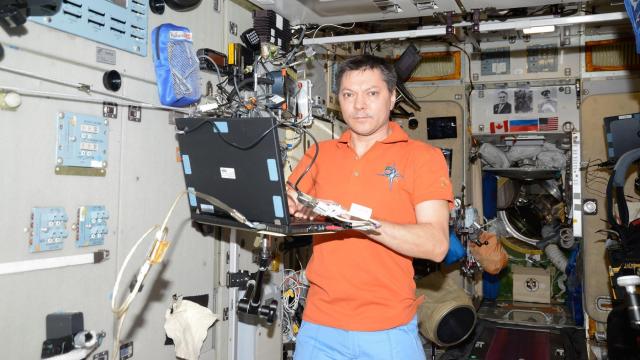As of Sunday, Russian cosmonaut Oleg Kononenko has clocked more time in Earth orbit than any other astronaut, surpassing the mark held by his Russian colleague Gennady Padalka. And as a fun quirk introduced by Einstein’s Special and General Theories of Relativity, Kononenko has travelled farther into the future than anyone else—even if by the tiniest fraction of a second.
Kononenko has now spent 879 days in orbit and counting. The illustrious record was set aboard the International Space Station at 3:30 a.m. ET on Sunday, February 4, when Kononenko smashed through Padalka’s previous record of 878 days, 11 hours, 29 minutes, and 48 seconds, according to Russian state news outlet TASS.
Both Padalka and Kononenko accomplished the feat across five orbital missions, with Padalka establishing his record during an ISS mission in 2015. Russian cosmonaut Valeri Polyakov holds the record for the longest single stay in space, hanging out on the Mir space station for 437 days (January 1994 to March 1995).
Kononenko, 59, who made his first trek to space in 2008, is now on course to establish some noteworthy milestones; he’ll reach the 1,000-day mark on June 5 and the 1,100-day mark in September, when his mission ends. The cosmonaut launched to the ISS on September 15, 2023, alongside Russian cosmonaut Nikolai Chub and NASA astronaut Loral O’Hara.
“I fly into space to do what I love, not to set records,” Kononenko told TASS, “I’ve dreamt of and aspired to become a cosmonaut since I was a child. That interest—the opportunity to fly into space, to live and work in orbit—motivates me to continue flying.”
Staying weightless long-term poses health risks, but Kononenko maintains a rigorous exercise routine to counteract the “insidious” effects of microgravity, as he puts it. And despite the vast distance from Earth, technology keeps him connected to loved ones, so he doesn’t feel “deprived or isolated,” he added. Kononenko said he’s proud of his various achievements, “but I am more proud that the record for the total duration of human stay in space is still held by a Russian cosmonaut.”
Indeed, when it comes to orbital duration records, Russians tend to dominate. NASA astronaut Jeffrey Williams holds the cumulative in-space record for the United States, spending 534 days in space across four missions, while NASA’s Frank Rubio holds the single duration record for the U.S., logging 371 consecutive days in orbit. NASA sets strict limits for how much time astronauts can spend in space over their careers, to manage the risk of radiation exposure.
Kononenko, by virtue of his orbital duration record, is a time traveller of sorts. When astronauts are in orbit, they are moving at high speeds relative to people on Earth; the ISS travels at 17,500 miles per hour (28,160 kilometres per hour), orbiting Earth approximately once every 90 minutes. Due to this high velocity, time passes slightly slower for astronauts in reference to people on the surface (to be clear, the subjective, personal sense of the passage of time remains constant). Physicist Albert Einstein articulated this phenomenon, known as time dilation, in his 1905 Special Theory of Relativity.
Einstein’s 1916 Theory of General Relativity imposes the opposite effect, in which the weak gravitational field makes time go slightly faster on the ISS compared to the surface. The net effect is that ISS astronauts experience time dilation that causes them to age slightly more slowly than people on Earth, but only by around 5 milliseconds, or 0.005 seconds, after six months.
So when Padalka returned to Earth in 2015 at the conclusion of his fifth and final mission, he found he missed out on 0.02 seconds of life on Earth compared to people who’d spent those years on the ground, due to the time dilation effects of high-speed space travel. That’s obviously an imperceptible amount of time, so this kind of “time travel” isn’t exactly the kind of thing portrayed in science fiction like Star Trek, Interstellar, and Disney’s Lightyear. For Kononenko, who will spend upwards of 1,100 days in orbit before coming home, this time dilation effect will be even greater (though still minuscule), marking him the greatest human time traveller to date.
To be clear, Einsteinian time dilation is a real thing. If you don’t believe it, just ask GPS satellite technicians, who must account for this phenomenon to ensure accurate global positioning services.
You’re now equipped with the knowledge that Padalka and Kononenko have traveled 1/44th of a second into the future compared to those of us who have stayed on the ground. Feel free to thank me after you’ve charmed the guests at your next dinner party.
